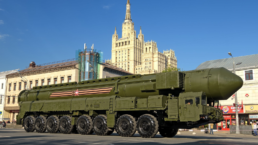Despite Putin’s stated emphasis on speedy nuclear modernization, several big-ticket systems have been plagued by multi-year delays and—in some cases—abrupt cancellations.
By Matt Korda, Outrider
In recent weeks, a fair amount of speculative ink has been spilled about the prospect of Vladimir Putin using nuclear weapons to achieve his war aims in Ukraine.
Thankfully, despite Putin’s overt nuclear signaling, the conflict remains well below the nuclear threshold. However, this doesn’t mean that Putin’s war in Ukraine won’t have potentially profound long-term consequences for Russia’s nuclear arsenal––specifically, its ability to complete its modernization program on time in the face of overwhelming sanctions.

Russia is in the midst of a decades-long nuclear modernization campaign to replace all of its Soviet-era weapons with new systems by the mid-2020s. This modernization is the top priority for both Russia’s military and for Putin.
In his annual end-of-year speech in 2020, Putin underscored the importance of keeping pace with Russia’s nuclear competitors: “It is absolutely unacceptable to stand idle. The pace of change in all areas that are critical for the Armed Forces is unusually fast today. It is not even Formula 1 fast – it is supersonic fast. You stop for one second, and you start falling behind immediately.”
Despite Putin’s stated emphasis on speedy nuclear modernization, several big-ticket systems have been plagued by multi-year delays and––in some cases––abrupt cancellations. These chronic delays have affected some of the most highly anticipated delivery systems in Russia’s nuclear arsenal.
Russia’s new Sarmat intercontinental ballistic missile (ICBM) was supposed to be operational by 2018 but wasn’t even flight tested until April 2022. Additionally, in 2018, Russia also postponed the Rubezh ICBM––originally intended to be one of the primary carriers for Russia’s Avangard hypersonic glide vehicle––and canceled the development of a rail-based ICBM known as Barguzin. The development of both Russia’s new Borei ballistic missile submarines and their Bulava submarine-launched ballistic missiles (SLBMs) were delayed by several years, along with the development of the next-generation PAK-DA strategic bomber.
All this is to say, Russia’s nuclear modernization hasn’t exactly been “Formula 1 fast.”
Recent Posts
‘Unconstitutional. Unethical. Authoritarian.’ ICE Bars Millions Of Immigrants From Bond Hearings
July 18, 2025
Take Action Now One watchdog said the new policy “seems like a blatant attempt to stop them from exercising their right to due process.”……
Americans Are Not Nearly Alarmed Enough About Climate Change
July 18, 2025
Take Action Now Americans still don’t comprehend how imminent, dangerous, and far-reaching the threat is—and journalists are partly to blame.By…
The IRS Is Building A Vast System To Share Millions Of Taxpayers’ Data With ICE
July 17, 2025
Take Action Now ProPublica has obtained the blueprint for the Trump administration’s unprecedented plan to turn over IRS records to Homeland Security…
Israel’s Sudden Assault On Syria Is Unchecked Aggression
July 17, 2025
Take Action Now Jerusalem is bombing Damascus and threatening al-Sharaa’s rule, while Washington was hoping to help the nascent government on…




